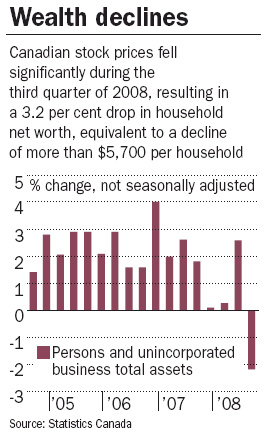Eric Beauchesne
Sun

The ratio of debt — in consumer credit and mortgages — to net worth edged up during the quarter to 20.9 cents of debt for every dollar of net worth and to $1.27 of debt for every dollar of disposable income. Photograph by : Fred Greenslade

OTTAWA – The plunge in the stock market last summer and early fall, along with the ensuing loss in pension savings and lower housing prices, wiped $191 billion off the net worth of Canadian households, the steepest loss in a decade.
And that was before the even steeper drop in the market since the end of September.
“Canadian stock prices fell significantly during the third quarter of 2008, resulting in a 3.2 per cent drop in household net worth . . . the largest percentage drop since the third quarter of 1998, when Canadian stock prices fell in response to the Asian financial crisis,” Statistics Canada reported Tuesday.
That, in turn, is more bad news for the outlook for consumer spending and the economy, according to Patricia Croft, chief economist at Phillips, Hager & North Investment Management Inc. in Toronto.
It’s the reverse wealth effect, she explained.
“As stock prices fall and house prices decline and we look at our portfolios and our pensions, and instead of buying a car we decide to walk,” she said. “That’s the implication for the economy.”
But as bad as it was here, the loss was even worse in the U.S., Statistics Canada noted.
“In comparison, household net worth in the United States fell 4.7 per cent in the third quarter, their fourth consecutive quarterly decline.”
In Canada, the stock market fell 18 per cent in the third quarter.
“The corresponding loss in directly held equities, combined with the related loss in the value of pension and life-insurance assets of households, was the principal factor behind the drop in net worth,” Statistics Canada said, noting that the value of total household assets fell 2.2 per cent in the July-through-September period. “Also contributing were slower growth in residential real-estate values and continued household borrowing.”
But for it’s not just the stock market that has darkened the outlook for pensions.
Results of a survey by pension-research firm Mercer found that over the past three years one-third of Canadian companies have made reductions to the benefits they provide for retired employees.
Further, 21 per cent expect to make reductions in the next three years, while only five per cent expect to make improvements, the Mercer report noted.
“Overall, companies are being forced to realign their total rewards spending, with the most significant cost savings being achieved by the elimination of retiree benefits for new hires and current (workers),” it said.
The Statistics Canada report, however, also revealed that growth in household debt slowed in the third quarter, reflecting lower new mortgage borrowing. Still, the ratio of debt – in consumer credit and mortgages – to net worth edged up during the quarter to 20.9 cents of debt for every dollar of net worth and to $1.27 of debt for every dollar of disposable income.
The increase in household debt relative to net worth was larger in the U.S., Statistics Canada noted.
Meanwhile, increased borrowing in the Canadian corporate sector translated into a slight increase in the non-financial private corporations’ debt-to-equity ratio, which has trended down for much of the last two decades, it reported. In the quarter, corporations had 53.6 cents of credit market debt for every dollar of equity.
In contrast to businesses and individuals, the government net debt-to-gross domestic product ratio declined further, the agency said, noting the federal government’s credit-market debt decreased thanks to funds received from the sale of wireless spectrum licences.
The drop in federal debt, however, was partially offset by increased borrowings by other levels of government, it said.
Overall, total government net debt as a percentage of the total value of goods and services produced by the economy edged down to just over 35 per cent in the third quarter, compared with the peak of 92 per cent in mid-1996.
And even with the large decline in the household sector’s net worth, growth in national net worth, which is the value of total assets less liabilities for all sectors, rose by a “robust” 3.3 per cent to $180,000 per person, up from $174,800 in the second quarter of 2008, the agency said.
National wealth amounted to just over $6 trillion as growth accelerated to 2.8 per cent.
© Copyright (c) Canwest News Service

